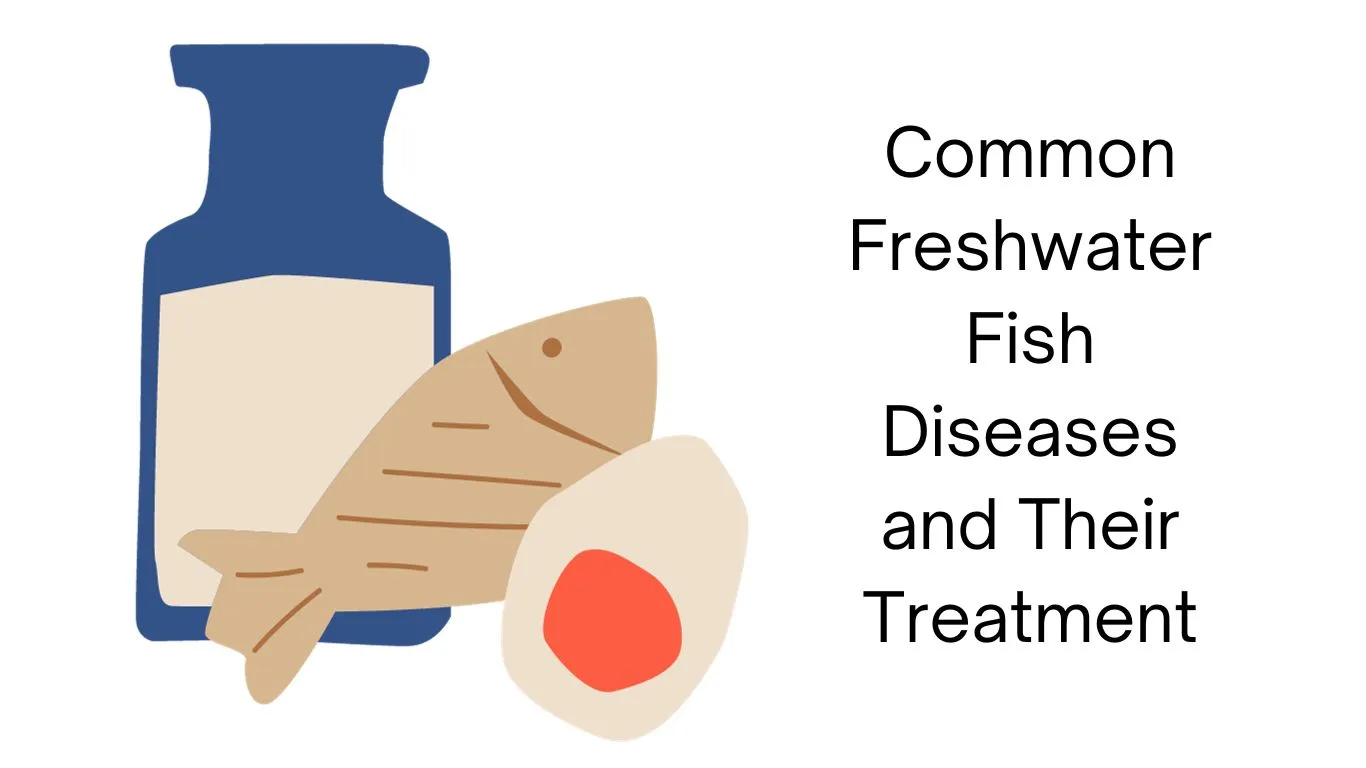Freshwater fish diseases can wreak havoc on your aquatic pets and disrupt the balance of your aquarium. Whether you’re a seasoned fish-keeper or a beginner, understanding the common diseases that can affect your freshwater fish is crucial for their health and well-being. In this article, we will explore the diverse range of diseases that can afflict freshwater fish, from the common Ich or “white spot disease” to fungal infections and bacterial diseases such as fin rot. We will delve into their causes, symptoms, and effective treatment options.
Common Types of Freshwater Fish Diseases
When it comes to freshwater fish diseases, there are several common types that every fish owner should be aware of. One of the most prevalent diseases is Ich, also known as “white spot disease.” This parasitic infection is easily recognized by the appearance of white spots on the fish’s body and fins. Another common disease is fin rot, which is caused by bacteria and results in the deterioration of the fish’s fins. Dropsy, a condition characterized by a swollen abdomen and raised scales, is also a prevalent disease among freshwater fish. Other diseases include swim bladder disorder, velvet disease, and columnar.
It’s essential to familiarize yourself with these diseases to be able to identify them early on. By doing so, you can take immediate action to prevent the spread of the disease and ensure the health of your fish. Regular observation and monitoring of your fish’s behavior and appearance are crucial for early detection.
Symptoms and Signs of Freshwater Fish Diseases
Recognizing the symptoms and signs of freshwater fish diseases is vital for prompt diagnosis and treatment. Each disease has its own set of distinctive symptoms. For instance, Ich is characterized by the presence of white spots on the fish’s body and fins. Fin rot, on the other hand, is marked by the deterioration of the fish’s fins, which may appear ragged or frayed. Dropsy is identified by the fish’s swollen abdomen and raised scales.
In addition to these specific symptoms, there are also general signs to watch out for, such as loss of appetite, lethargy, abnormal swimming behavior, discoloration, and rapid breathing. It’s important to note that some diseases may exhibit overlapping symptoms, making it necessary to consult a veterinarian or do further research for an accurate diagnosis.
Causes and Risk Factors of Freshwater Fish Diseases
Understanding the causes and risk factors of freshwater fish diseases is crucial for prevention and effective treatment. Many diseases are caused by poor water quality, such as high levels of ammonia, nitrites, or nitrates. Stress is also a significant factor that weakens the fish’s immune system and makes them more susceptible to diseases. Overcrowding, improper diet, and inadequate tank maintenance can all contribute to stress and the development of diseases.
Introducing new fish to the aquarium without quarantine is another common cause of disease outbreaks. Fish brought in from outside sources may carry pathogens that can infect the existing fish population. Therefore, it’s essential to quarantine new fish before introducing them to the main tank.
Prevention and Control of Freshwater Fish Diseases
Prevention is always better than cure when it comes to freshwater fish diseases. There are several steps you can take to minimize the risk of disease outbreaks in your aquarium. First and foremost, maintaining excellent water quality is crucial. Regularly test the water parameters and ensure they are within the appropriate range for your fish species. Proper filtration and regular water changes are also essential for keeping the water clean and free from harmful substances.
Another important preventive measure is quarantine. When introducing new fish to your aquarium, it’s recommended to keep them in a separate quarantine tank for a few weeks. This allows you to monitor their health and ensure they are not carrying any diseases before introducing them to the main tank.
Providing a well-balanced diet is also vital for the overall health and immunity of your fish. Research the dietary requirements of your specific fish species and feed them high-quality food that meets their nutritional needs. Avoid overfeeding, as excess food can lead to water contamination and increase the risk of diseases.
Proper Tank Maintenance to Prevent Fish Diseases
Maintaining a clean and well-maintained aquarium is essential for preventing fish diseases. Regular tank maintenance involves several tasks, such as cleaning the tank walls, gravel vacuuming, and replacing the filter media when necessary. It’s important to remove any uneaten food, decaying plants, or waste from the tank to prevent the accumulation of harmful substances.
Regular water changes are also crucial to remove toxins and replenish essential minerals. The frequency and amount of water changes depending on the size of your tank and the number of fish you have. Generally, a 25% water change every two weeks is recommended for most freshwater aquariums.
Additionally, ensure that the aquarium equipment, such as filters and heaters, are functioning properly. Regularly clean and maintain these devices to ensure they are providing the necessary filtration and maintaining the ideal water temperature.
Treating Freshwater Fish Diseases
If your fish has already contracted a disease, prompt treatment is necessary to prevent further complications and potential loss. The treatment options vary depending on the specific disease and its severity. For mild cases, simple remedies such as increasing the water temperature or adding aquarium salt may be effective. However, more severe cases may require the use of medications specifically designed to treat the particular disease.
It’s important to follow the instructions provided with the medication carefully and complete the full course of treatment. Failure to do so may result in the disease recurring or developing resistance to the medication. During treatment, it’s also crucial to monitor the fish closely and make any necessary adjustments to the tank environment to support their recovery.
Natural Remedies for Freshwater Fish Diseases
In addition to conventional medications, there are also natural remedies that can be used to treat freshwater fish diseases. These remedies are often gentler on the fish and may be preferred by some fish owners. For example, the use of Indian almond leaves or tea tree oil is effective against certain diseases and can help boost the fish’s immune system. Garlic has also been shown to have antimicrobial properties and can be used to treat bacterial infections.
It’s important to note that while natural remedies can be beneficial, they may not always be a substitute for conventional medications, especially in severe cases. It’s best to consult with a veterinarian or an experienced fish keeper for guidance on the appropriate use of natural remedies for specific diseases.
When to Consult a Veterinarian for Freshwater Fish Diseases
In some cases, it may be necessary to seek professional help from a veterinarian specializing in fish diseases. While many common diseases can be treated at home, there are instances where expert advice and intervention are required. If your fish’s condition worsens despite appropriate treatment, or if you are unsure about the diagnosis or treatment plan, it’s best to consult a veterinarian.
A veterinarian will be able to conduct a thorough examination, perform necessary tests, and provide targeted treatment options based on the specific disease and the fish’s condition. They can also guide preventive measures and offer valuable advice on maintaining the health and well-being of your fish.
Conclusion and Final Thoughts
Keeping your freshwater fish healthy and disease-free requires knowledge, vigilance, and proper care. By familiarizing yourself with the common types of freshwater fish diseases, their symptoms, causes, and treatment options, you can take proactive measures to prevent disease outbreaks and ensure the well-being of your fish.
Regular observation, maintaining excellent water quality, and providing a well-balanced diet are crucial preventive measures. Proper tank maintenance, including regular cleaning and water changes, is essential for creating a healthy environment for your fish. Prompt treatment, whether through conventional medications or natural remedies, is necessary if your fish contract a disease.
Learn more about proper water parameters for home aquariums
Remember, if you’re ever unsure about a diagnosis or treatment plan, it’s best to consult a veterinarian specializing in fish diseases. With the right knowledge and care, you can enjoy a thriving aquarium filled with healthy and vibrant freshwater fish.


1 thought on “Freshwater Fish Diseases: Cure Them Before It’s Too Late!”